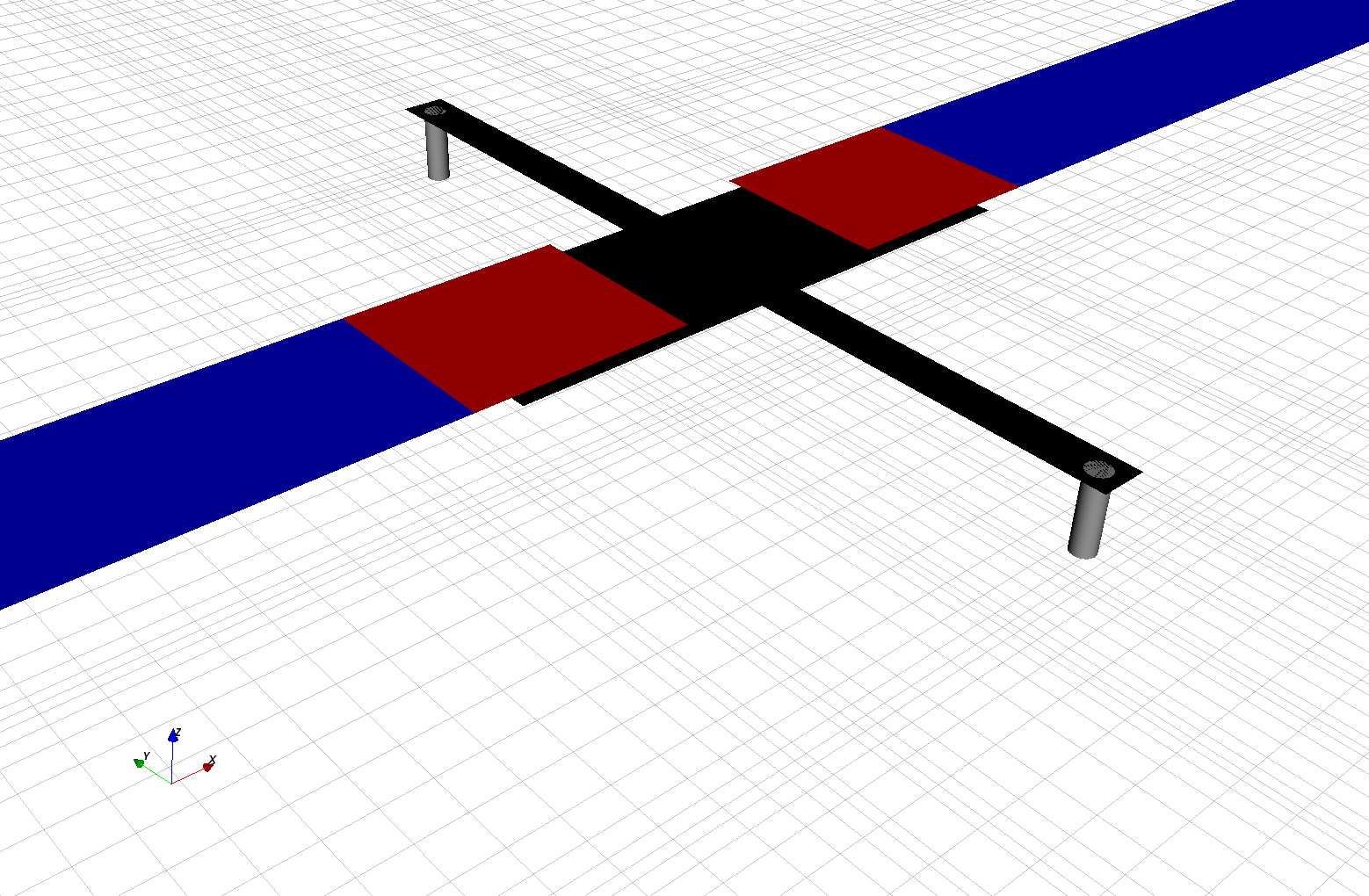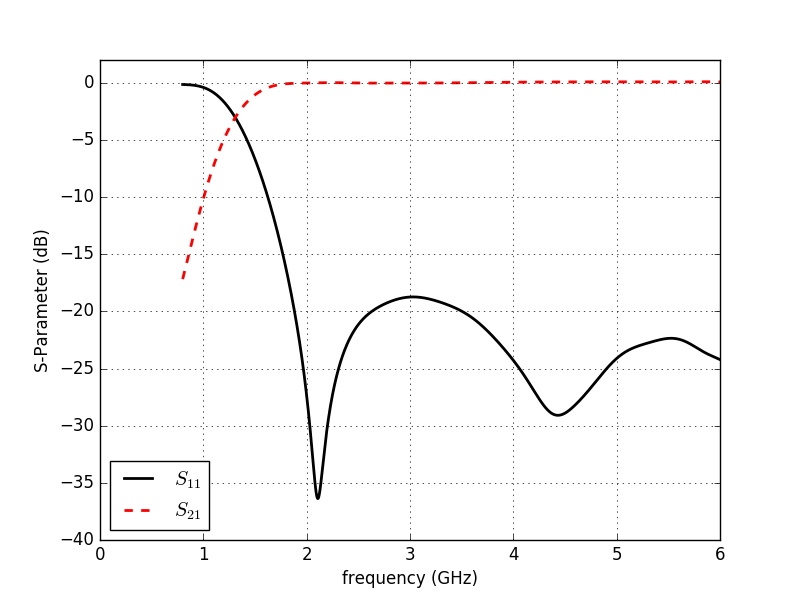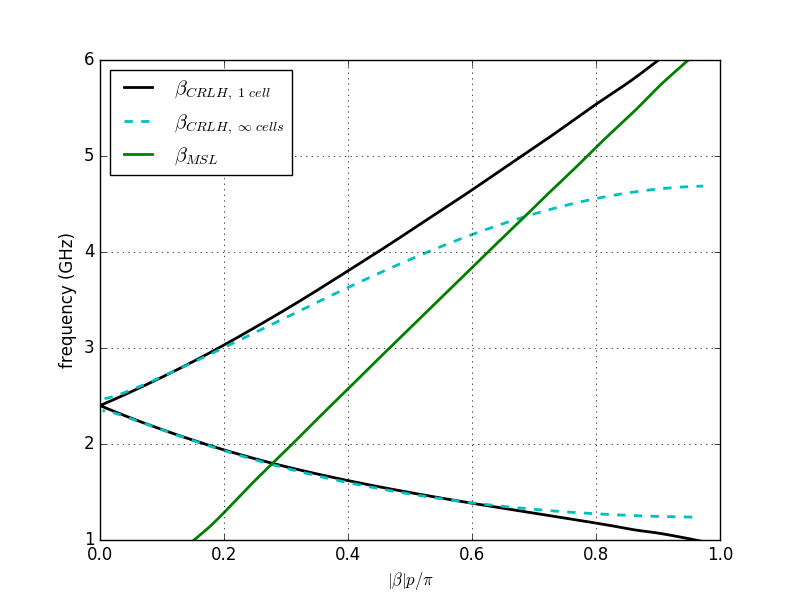CRLH Parameter Extraction
Setup a composite-right/left-handed (CRLH) unit cell and extract the equivalent circuit parameter.
Introduction
This tutorial covers:
Setup a feeding mircostrip line & port
Apply an inhomogeneous mesh used for improved accuracy and simulation speed
Use an internal clss to setup a CRLH unit cell
Use the port voltages and currents to extract the unit cell equivalent circuit parameter

CRLH unit cell with feeding MSL.
Python Script
Get the latest version from git.
Import Libraries
import os, tempfile
from pylab import *
from CSXCAD import ContinuousStructure
from openEMS import openEMS
from openEMS.physical_constants import *
Class to represent single CRLH unit cells
class CRLH_Cells:
def __init__(self, LL, LW, Top, Bot, GLT, GLB, SL, SW, VR):
self.LL = LL # Line length
self.LW = LW # Line width
self.Top = Top # top signal height
self.Bot = Bot # bottom signal height
self.GLT = GLT # gap length top
self.GLB = GLB # gap length bottom
self.SL = SL # stub length
self.SW = SW # stub width
self.VR = VR # via radius
self.props = dict() # property dictionary
self.edge_resolution = None
def createProperties(self, CSX):
for p in ['metal_top', 'metal_bot', 'via']:
self.props[p] = CSX.AddMetal(p)
def setEdgeResolution(self, res):
self.edge_resolution = res
def createCell(self, translate = [0,0,0]):
mesh = [[],[],None]
third_res = self.edge_resolution/3
translate = array(translate)
start = [-self.LL/2 , -self.LW/2, self.Top] + translate
stop = [-self.GLT/2, self.LW/2, self.Top] + translate
box = self.props['metal_top'].AddBox(start, stop, priority=10)
# create edge mesh at +x and -+y
mesh[0] += [stop[0]-third_res, stop[0]+2*third_res]
mesh[1] += [stop[1]-third_res, stop[1]+2*third_res]
mesh[1] += [start[1]-2*third_res, start[1]+third_res]
start = [+self.LL/2 , -self.LW/2, self.Top] + translate
stop = [+self.GLT/2, self.LW/2, self.Top] + translate
box = self.props['metal_top'].AddBox(start, stop, priority=10)
# create edge mesh at -x
mesh[0] += [stop[0]-2*third_res, stop[0]+third_res]
start = [-(self.LL-self.GLB)/2, -self.LW/2, self.Bot] + translate
stop = [+(self.LL-self.GLB)/2, self.LW/2, self.Bot] + translate
box = self.props['metal_bot'].AddBox(start, stop, priority=10)
# create edge mesh at -+x
mesh[0] += [start[0]+third_res, start[0]-2*third_res]
mesh[0] += [stop[0]-third_res, stop[0]+2*third_res]
start = [-self.SW/2, -self.LW/2-self.SL, self.Bot] + translate
stop = [+self.SW/2, self.LW/2+self.SL, self.Bot] + translate
box = self.props['metal_bot'].AddBox(start, stop, priority=10)
# create edge mesh at -+x and -+y
mesh[0] += [start[0]+third_res, start[0]-2*third_res]
mesh[0] += [stop[0]-third_res, stop[0]+2*third_res]
mesh[1] += [start[1]+third_res, start[1]-2*third_res]
mesh[1] += [stop[1]-third_res, stop[1]+2*third_res]
start = [0, -self.LW/2-self.SL+self.SW/2, 0 ] + translate
stop = [0, -self.LW/2-self.SL+self.SW/2, self.Bot] + translate
self.props['via'].AddCylinder(start, stop, radius=self.VR, priority=10)
start[1] *= -1
stop [1] *= -1
self.props['via'].AddCylinder(start, stop, radius=self.VR, priority=10)
return mesh
if __name__ == '__main__':
### Setup the simulation
Sim_Path = os.path.join(tempfile.gettempdir(), 'CRLH_Extraction')
post_proc_only = False
unit = 1e-6 # specify everything in um
feed_length = 30000
substrate_thickness = [1524, 101 , 254 ]
substrate_epsr = [3.48, 3.48, 3.48]
CRLH = CRLH_Cells(LL = 14e3, LW = 4e3, GLB = 1950, GLT = 4700, SL = 7800, SW = 1000, VR = 250 , \
Top = sum(substrate_thickness), \
Bot = sum(substrate_thickness[:-1]))
# frequency range of interest
f_start = 0.8e9
f_stop = 6e9
### Setup FDTD parameters & excitation function
CSX = ContinuousStructure()
FDTD = openEMS(EndCriteria=1e-5)
FDTD.SetCSX(CSX)
mesh = CSX.GetGrid()
mesh.SetDeltaUnit(unit)
CRLH.createProperties(CSX)
FDTD.SetGaussExcite((f_start+f_stop)/2, (f_stop-f_start)/2 )
BC = {'PML_8' 'PML_8' 'MUR' 'MUR' 'PEC' 'PML_8'}
FDTD.SetBoundaryCond( ['PML_8', 'PML_8', 'MUR', 'MUR', 'PEC', 'PML_8'] )
### Setup a basic mesh and create the CRLH unit cell
resolution = C0/(f_stop*sqrt(max(substrate_epsr)))/unit /30 # resolution of lambda/30
CRLH.setEdgeResolution(resolution/4)
mesh.SetLines('x', [-feed_length-CRLH.LL/2, 0, feed_length+CRLH.LL/2])
mesh.SetLines('y', [-30000, 0, 30000])
substratelines = cumsum(substrate_thickness)
mesh.SetLines('z', [0, 20000])
mesh.AddLine('z', cumsum(substrate_thickness))
mesh.AddLine('z', linspace(substratelines[-2],substratelines[-1],4))
# create the CRLH unit cell (will define additional fixed mesh lines)
mesh_hint = CRLH.createCell()
mesh.AddLine('x', mesh_hint[0])
mesh.AddLine('y', mesh_hint[1])
# Smooth the given mesh
mesh.SmoothMeshLines('all', resolution, 1.2)
### Setup the substrate layer
substratelines = [0] + substratelines.tolist()
start, stop = mesh.GetSimArea()
for n in range(len(substrate_thickness)):
sub = CSX.AddMaterial( 'substrate_{}'.format(n), epsilon=substrate_epsr[n] )
start[2] = substratelines[n]
stop [2] = substratelines[n+1]
sub.AddBox( start, stop )
### Add the feeding MSL ports
pec = CSX.AddMetal( 'PEC' )
port = [None, None]
x_lines = mesh.GetLines('x')
portstart = [ x_lines[0], -CRLH.LW/2, substratelines[-1]]
portstop = [ -CRLH.LL/2, CRLH.LW/2, 0]
port[0] = FDTD.AddMSLPort( 1, pec, portstart, portstop, 'x', 'z', excite=-1, FeedShift=10*resolution, MeasPlaneShift=feed_length/2, priority=10)
portstart = [ x_lines[-1], -CRLH.LW/2, substratelines[-1]]
portstop = [ +CRLH.LL/2 , CRLH.LW/2, 0]
port[1] = FDTD.AddMSLPort( 2, pec, portstart, portstop, 'x', 'z', MeasPlaneShift=feed_length/2, priority=10)
### Run the simulation
if 1: # debugging only
CSX_file = os.path.join(Sim_Path, 'CRLH_Extraction.xml')
if not os.path.exists(Sim_Path):
os.mkdir(Sim_Path)
CSX.Write2XML(CSX_file)
from CSXCAD import AppCSXCAD_BIN
os.system(AppCSXCAD_BIN + ' "{}"'.format(CSX_file))
if not post_proc_only:
FDTD.Run(Sim_Path, cleanup=True)
### Post-Processing
f = linspace( f_start, f_stop, 1601 )
for p in port:
p.CalcPort( Sim_Path, f, ref_impedance = 50, ref_plane_shift = feed_length)
# calculate and plot scattering parameter
s11 = port[0].uf_ref / port[0].uf_inc
s21 = port[1].uf_ref / port[0].uf_inc
plot(f/1e9,20*log10(abs(s11)),'k-' , linewidth=2, label='$S_{11}$')
plot(f/1e9,20*log10(abs(s21)),'r--', linewidth=2, label='$S_{21}$')
grid()
legend(loc=3)
ylabel('S-Parameter (dB)')
xlabel('frequency (GHz)')
ylim([-40, 2])
### Extract CRLH parameter form ABCD matrix
A = ((1+s11)*(1-s11) + s21*s21)/(2*s21)
C = ((1-s11)*(1-s11) - s21*s21)/(2*s21) / port[1].Z_ref
Y = C
Z = 2*(A-1)/C
iZ = imag(Z)
iY = imag(Y)
fse = interp(0, iZ, f)
fsh = interp(0, iY, f)
df = f[1]-f[0]
fse_idx = np.where(f>fse)[0][0]
fsh_idx = np.where(f>fsh)[0][0]
LR = 0.5*(iZ[fse_idx]-iZ[fse_idx-1])/(2*pi*df)
CL = 1/(2*pi*fse)**2/LR
CR = 0.5*(iY[fsh_idx]-iY[fsh_idx-1])/(2*pi*df)
LL = 1/(2*pi*fsh)**2/CR
print(' Series tank: CL = {:.2f} pF, LR = {:.2f} nH -> f_se = {:.2f} GHz '.format(CL*1e12, LR*1e9, fse*1e-9))
print(' Shunt tank: CR = {:.2f} pF, LL = {:.2f} nH -> f_sh = {:.2f} GHz '.format(CR*1e12, LL*1e9, fsh*1e-9))
### Calculate analytical wave-number of an inf-array of cells
w = 2*pi*f
wse = 2*pi*fse
wsh = 2*pi*fsh
beta_calc = real(arccos(1-(w**2-wse**2)*(w**2-wsh**2)/(2*w**2/CR/LR)))
# plot
figure()
beta = -angle(s21)/CRLH.LL/unit
plot(abs(beta)*CRLH.LL*unit/pi,f*1e-9,'k-', linewidth=2, label=r'$\beta_{CRLH,\ 1\ cell}$' )
grid()
plot(beta_calc/pi,f*1e-9,'c--', linewidth=2, label=r'$\beta_{CRLH,\ \infty\ cells}$')
plot(real(port[1].beta)*CRLH.LL*unit/pi,f*1e-9,'g-', linewidth=2, label=r'$\beta_{MSL}$')
ylim([1, 6])
xlabel(r'$|\beta| p / \pi$')
ylabel('frequency (GHz)')
legend(loc=2)
show()
Images

CRLH cell S-parameter

CRLH unit cell dispersion diagram